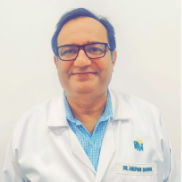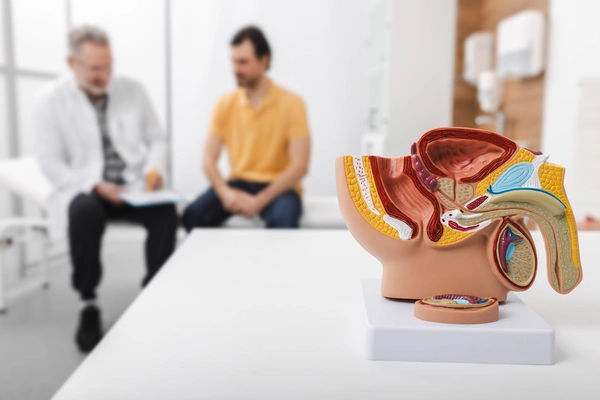Erectile Dysfunction: Causes, and Prevention
Learn about the common causes of erectile dysfunction and practical prevention tips to support better sexual health and overall well-being.


Introduction
Erectile dysfunction (ED) is a common concern for men, but it's often misunderstood as an inevitable part of aging. The truth is, while age can be a factor, ED is frequently a warning sign of underlying health issues and is highly preventable. Think of erectile function as a barometer for your overall health, particularly your cardiovascular system. This article demystifies the complex causes of ED, from physical conditions to psychological stressors, and provides a powerful, proactive blueprint for prevention. We'll move beyond quick fixes and focus on sustainable lifestyle changes that protect not just your sexual health, but your entire well-being. By understanding what leads to the signs of erectile dysfunction, you can take confident steps toward prevention and long-term vitality.
Understanding Erectile Dysfunction: More Than Just a Moment
Erectile dysfunction is more than a temporary issue; it can signal underlying health concerns that need attention and care.
What Exactly is Erectile Dysfunction?
Erectile dysfunction is defined as the consistent inability to achieve or maintain an erection firm enough for satisfactory sexual intercourse. It's important to distinguish between occasional difficulties, which are normal and can happen to any man due to stress or fatigue, and chronic ED, which occurs more than 50% of the time. ED is not a disease itself but a symptom of another problem, either physical, psychological, or a mix of both.
Consult a Urologist for the best advice
The Root Causes: What Truly Leads to ED
Understanding the "why" is the first step toward effective erectile dysfunction prevention. The process of an erection is a complex interplay of nerves, blood vessels, hormones, and emotions. A glitch in any of these systems can lead to issues.
Physical and Medical Causes of ED
From heart disease to hormonal imbalances, several health conditions can contribute to erectile dysfunction.
Cardiovascular Health: The Heart of the Matter
Your heart and your erections are intimately connected. An erection relies on ample blood flow to the penis. Conditions like atherosclerosis (clogged arteries), hypertension (high blood pressure), and high cholesterol can narrow and harden arteries, reducing blood flow throughout the body, and the penis is often the first place this reduced flow becomes apparent.
Neurological Conditions and Nerve Damage
The nervous system sends essential signals that trigger the relaxation of penile muscles and allow blood to flow in. Conditions like multiple sclerosis (MS), Parkinson's disease, spinal cord injuries, and even complications from prostate surgery can damage these nerves, interrupting the signal. Furthermore, diabetes is a major culprit, as prolonged high blood sugar can cause diabetic neuropathy, damaging both blood vessels and nerves essential for erections.
Hormonal Imbalances: The Role of Testosterone
While not the sole hormone involved, testosterone plays a key role in regulating libido (sex drive). Low testosterone levels can diminish desire, which can then contribute to erectile difficulties. Other hormonal issues, such as thyroid problems or elevated prolactin, can also disrupt the delicate hormonal balance needed for sexual function.
Psychological and Emotional Triggers
The mind is a powerful stimulant and a powerful inhibitor. Even if everything is physically functional, psychological factors can prevent or hinder an erection.
Stress, Anxiety, and Performance Pressure
Work stress, financial worries, and relationship problems can consume mental energy and reduce libido. More specifically, performance anxiety, the fear of not being able to perform sexually, can create a vicious cycle. Worrying about getting an erection can cause so much stress that it becomes a self-fulfilling prophecy.
Depression and Its Impact on Libido
Depression is a profound mood disorder that dampens interest in almost all activities, including sex. It can cause fatigue, low self-esteem, and a chemical imbalance in the brain that directly suppresses libido. It's also important to note that some antidepressant medications can have ED as a side effect.
Lifestyle Choices: The Controllable Risk Factors
These are the factors within your direct control, making them the primary focus of natural ED prevention.
The Impact of Smoking and Alcohol
Smoking is devastating for vascular health. The chemicals in cigarettes damage the lining of blood vessels and contribute to atherosclerosis, directly impairing blood flow. Excessive alcohol consumption is a central nervous system depressant. While a drink might lower inhibitions, too much can numb the nervous system, making it difficult to achieve an erection and can also suppress testosterone production over time.
Sedentary Habits and Obesity
A sedentary lifestyle contributes to obesity, which is linked to a host of ED risk factors: hormonal changes (lower testosterone, higher estrogen), cardiovascular disease, and diabetes. Excess belly fat, in particular, is associated with inflammation and poor vascular health. Lack of exercise means your cardiovascular system isn't being conditioned to pump blood efficiently.
Proactive Prevention: Your Shield Against ED
The good news is that by addressing the controllable risk factors, you can significantly reduce your risk of ED and even improve existing symptoms.
Fuel Your Body: The ED Prevention Diet
What you eat directly impacts your vascular health. Adopt a heart-healthy diet like the Mediterranean diet, which is rich in fruits, vegetables, whole grains, and healthy fats.
Key Nutrients for Vascular Health
Nitric Oxide Precursors: Foods like leafy greens (spinach, arugula), beets, and dark chocolate help your body produce nitric oxide, a molecule that relaxes blood vessels and improves blood flow.
Antioxidants: Berries, citrus fruits, and nuts fight oxidative stress and inflammation, protecting blood vessel linings.
Zinc: Found in oysters, pumpkin seeds, and lentils, zinc is crucial for testosterone production.
Get Moving: Exercise for Erection Quality
Regular exercise is one of the most effective natural ways to avoid ED. It improves blood circulation, reduces stress, helps with weight management, and can boost testosterone levels.
Cardio for Circulation
Aim for at least 30 minutes of moderate-intensity cardio most days of the week. Brisk walking, jogging, swimming, and cycling get your heart pumping and improve overall vascular function.
Pelvic Floor Exercises (Kegels)
Often overlooked by men, these exercises strengthen the bulbocavernosus muscle, which helps maintain erections by stopping blood from leaving the penis prematurely. To find the muscle, try to stop the flow of urine mid-stream. Squeeze that muscle, hold for 3 seconds, then relax for 3 seconds. Aim for 3 sets of 10-15 repetitions daily.
Prioritise Mental Well-being and Sleep
Managing stress through techniques like meditation, deep breathing, or yoga can dramatically improve psychological ED triggers. Furthermore, prioritise 7-9 hours of quality sleep per night. Sleep is when your body produces testosterone; poor sleep can significantly lower your levels.
Regular Health Check-ups and Open Communication
See your doctor for regular screenings for blood pressure, cholesterol, and blood sugar. If you notice consistent changes in your erectile function, don't suffer in silence. It's a medical issue, not a personal failure. If symptoms persist beyond two weeks, consult a doctor online with Apollo24|7 for further evaluation. They can help determine if the cause is physical, psychological, or both, and create a tailored management plan
Conclusion: Empowerment Through Prevention
Viewing erectile dysfunction not as an isolated condition but as an integral part of your overall health landscape is empowering. The same habits that protect your heart, manage your weight, and sharpen your mind are the very same ones that safeguard your sexual function. Prevention isn't about a single magic pill; it's about the cumulative power of daily choices: choosing a walk over the couch, a salad over processed food, and a good night's sleep over late-night screen time. By taking control of the factors within your reach, you invest in a future of robust health and vitality. If your condition does not improve after trying these methods, consult a doctor to rule out any serious underlying conditions and explore all available treatment options.
Consult a Urologist for the best advice
Consult a Urologist for the best advice
Dr S K Singhanina
Urologist
25 Years • MBBS/MS/DNB AND MCH UROLOGY
Guwahati
Apollo Clinic Guwahati, Assam, Guwahati

Dr. Sudhakar G V
Urologist
25 Years • MBBS, MS(Gen.Surgery), DNB Urology
Bengaluru
Apollo Clinic, JP nagar, Bengaluru

Dr. Ramesh H
Urologist
16 Years • MBBS, MS , Mch( Urology)
Bengaluru
Apollo Clinic, JP nagar, Bengaluru

Dr. Pavan Kumar S K
Urologist
11 Years • MBBS, MS , Mch( Urology) DNB (Urology)
Bengaluru
Apollo Clinic, JP nagar, Bengaluru

Dr Anupam Sharma
Urologist
18 Years • MBBS, MS(Gen Surgery), DNB (Urology)
Delhi
Apollo Hospitals Indraprastha, Delhi
(25+ Patients)
More articles from Erectile Dysfunction
Frequently Asked Questions
1. Can erectile dysfunction be reversed naturally?
2. What are the best vitamins for male sexual health?
While a balanced diet is best, some key vitamins and supplements support male sexual health. These include L-arginine (a precursor to nitric oxide), Zinc, Vitamin D (often low in men with ED), and Omega-3 fatty acids. Always consult a doctor before starting any new supplement regimen.
3. How does stress cause ED?
Stress triggers the release of adrenaline and cortisol, hormones that constrict blood vessels and shift the body's priority away from non-essential functions like reproduction. This 'fight or flight' response directly counteracts the relaxation needed for an erection
4. At what age should I start worrying about ED prevention?
It's never too early to start. The lifestyle habits you form in your 20s and 30s, like maintaining a healthy weight and not smoking, set the foundation for your vascular health in your 40s, 50s, and beyond. Prevention is a lifelong endeavor.
5. Are there any specific foods I should avoid to prevent ED?
Yes, it's best to limit foods that harm vascular health. These include processed foods high in saturated and trans fats, sugary drinks and snacks, excessive red meat, and refined carbohydrates. These contribute to obesity, diabetes, and atherosclerosis, all risk factors for ED.




